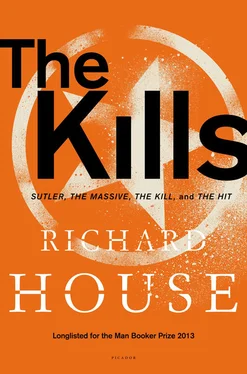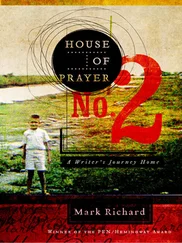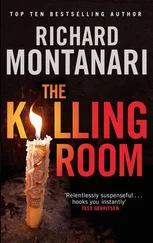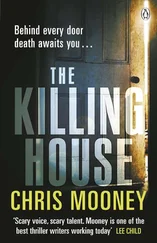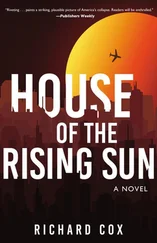‘You speak any Turkish?’ he asked Ford.
The soldier spoke to the boy rapid-fire, aggressive, he snapped the dog to heel and toe-tapped the backpack. The boy became angry, and Ford expected a confrontation.
A shout came from further up the queue. Suddenly nervous, the passengers broke out of line and scattered, and there in the widening gap a slim green snake zippered across the white gravel. The soldiers grouped about it, one flicked a cigarette, another kicked stones and the snake changed direction, twisting in a strange undulation, fast, but not fast enough. A third soldier picked up a rock, a flat white slab, dropped it then laughed. Ford watched the snake wind about itself, its skin a sharp fresh green, the body as thin as his little finger. Head mashed to a crimson stump, its silver underside caught the sun as it rolled into tight coils.
The student asked if it was poisonous.
Ford said he didn’t know but thought that colour gave some indication.
The student turned the snake over with his foot. The body twisted about his sandal and he gently shook it off. He looked up at the soldier. ‘Why?’ he asked. ‘Seriously. What was the point?’
The soldier picked up the snake and slung it across the road — and the student swore loud enough to be heard.
‘I think he might know that word.’
‘They probably hear it enough.’
Ford returned to his backpack, uninterested in the student’s disagreement.
The soldiers walked on, attention taken by another vehicle drawing up the highway. The officer in charge slapped the side of the coach to dismiss them; others began to move the barriers and open the road. As a group the passengers picked up their luggage and returned to the coach. Leaving the first group gathered by the tractor-trailer alone. The student returned for his case. Catching up with Ford, the boy offered his hand.
‘My name’s Eric.’
* * *
A wave of cold air blew through the cabin as the coach drew back onto the road.
The student turned about and held up the plastic bag he’d stowed away earlier. A bag of digital memory sticks. ‘Two days ago the army raided a village on the border,’ he explained. ‘They came in trucks. About fourteen of them, and they shipped everyone out. Then helicopters wiped out the village. They used rockets.’ He shook the bag and spoke in a low conspiratorial tone. ‘They’re making all of this happen. None of this is any accident. For days they’ve been bombing their own border and blaming the Kurds. Every time trouble kicks off in the Middle East they move against the Kurds. Fact.’
When the boy turned back Ford smiled to himself. He should have guessed the boy was doing noble favours, picking other people’s fights, working an adventure to take back to his campus, to become someone who has been somewhere and done something.
* * *
The stops became less frequent; the villages became smaller and the refugee camps so few that Ford forgot them and imagined himself to be in a country unaffected by war.
In the early afternoon they stopped at a small trading post, a restaurant girdled by a market — a supple chaos of stalls set up in the dust with passengers haggling for produce: fresh dates, dyed pistachios, halva, cigarettes, toys, CDs and DVDs. Young boys sold flags, iced water, sodas, and pastries wet with honey. Smoke blossomed from a row of barbecues and Ford bought two lamb skewers and finished before he could find himself a seat. The attendant who gave out the rosewater and paper towels sat at a separate table, smoking, eyes narrowed on Ford.
Ford wandered through the stalls. Men sold jewellery, bracelets and beaded bangles, small handcrafted pieces. One man punched names into metal dog tags. He set the letters into a punch and imprinted the tags in a small vice. Ford stopped in front of the table and idled through a tray of Zippo lighters. The man spoke to him and he smiled but did not reply.
‘American?’ the man asked. ‘English? You want your name?’ The man held up one of the tags to show Ford. The man had a lazy eye, not so acute, but noticeable. He wore a jacket and no shirt. When he looked up the lazy eye shifted with a slight but perceptible twitch, the movement so subtle that Ford found himself watching to catch it. The man waited, all patience. Searching for money, Ford pushed his hands into his pocket and found the note with the account numbers. An idea occurred to him and he held up the note.
‘How much,’ he asked, ‘for only numbers. These numbers.’ He opened out the paper and showed it to the man. ‘Five tags.’ He held up his hand, five wide fingers. ‘Five. You can do numbers? How much for five tags?’
The man squinted at the paper then smiled as he looked up and Ford could not be sure that he’d understood. He found a pen on the table and began to write out the numbers to be stamped on each tag. A separate number on each sheet. ‘You understand?’ He set a tag on the paper. ‘This for this.’
The man nodded. Ford continued to write out the numbers and did not notice the student approach.
‘I didn’t get your name.’
‘Sorry?’
‘Your name?’
Ford concentrated on the numbers. The boy wanted a name. ‘Michael.’
‘Michael, not Mike?’
‘Right, it’s Michael.’
‘You’re English?’
Ford nodded. He finished writing the last of the numbers and handed them to the man. One account number per tag. The workman held up his hands to indicate that he would be ten minutes.
‘That’s all? Ten minutes?’
The man nodded and began to set the numbers into the punch.
The student followed Ford back to the restaurant. ‘My mother’s English. She still has her accent.’ Without asking he set his book on the table and sat opposite. Tucked between the pages a small black notebook. ‘Do you know Winchester?’
For the first time Ford noticed that the restaurant sat in a field. The coach had driven off the road and over rough land to reach it. To steer the conversation away from himself he pointed at the book and asked what the boy was reading.
‘This? I’m just getting into it. I’m not that far.’
They were talking, he guessed, because the boy felt some common ground between them, something more than the simple coincidence of travel. The silver case, the snake, the confidence about the film, connecting elements, at least for the boy.
‘It’s making its way round campuses. There’s a whole story about it. The guy who wrote it was a student, and he disappeared before the book came out. It’s about how these guys, these brothers, copy a murder from another book, a thriller.’ He held up the book. ‘It’s true. They pick someone up from the train station, then cut him up in a basement room, just like the story, then pieces of him are found in the street. It happened in Naples, Italy. There’s any number of versions on this story — the original book wasn’t published in English till about ten years ago — but the writer, this student, went to Naples and wrote about the people who still lived in the apartment where the murder happened, and then he disappeared. You’ve not heard about it?’
Ford said no.
‘There’s a film also. I think it’s just out in the States.’ The boy grimaced. ‘I haven’t read the original book yet. The one the brothers copied. But imagine. You write about something like that, a thriller, something gruesome, and someone copies everything you’ve written for real.’
‘What’s it called?’
The boy unfolded the cover and held the book up for Ford to read. ‘The original book or this? There’s a buzz about it online. Anyway, it’s huge on campus.’
‘So what’s it called?’
‘The original is called The Kill. You’re not supposed to say the title or something bad will happen. You disappear.’ He nodded toward the coach and grinned. ‘I saw you at Kopeckale. You look like you’ve been in an accident.’
Читать дальше
